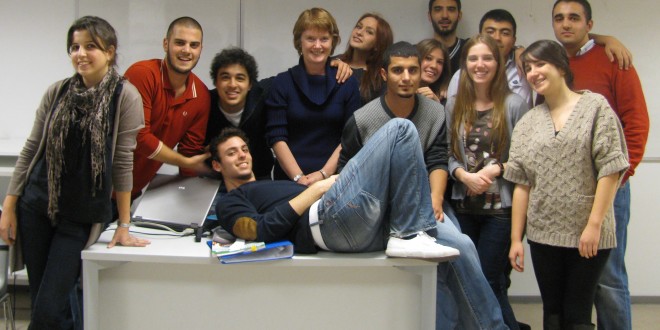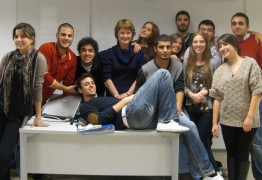Next weekend, Turkish high school seniors will take the life-defining OSYS or Higher Education Undergraduate Placement Examination. Since the late 1960s, this 195-minute test has determined who among Turkish high school graduates will go to university and which university they will attend. The reason Turkey adopted this exam is that there are far more Turkish students (about 1.69 million took the OSYS last year) wishing to attend university than there are spots. Approximately a half million students currently fill about 170 universities, so two-thirds of university applicants are rejected.
Let me make a few points before explaining the system. First, Turks highly value college education. Second, the goal of all Turkish universities is to be large, as size enhances their prestige. Third, Turkey’s best public universities, long-established and with lower fees, are better regarded than the best private universities. The two best universities in the land are Middle East Technical in Ankara and Bosphorus University in Istanbul, both public.
So college admissions in Turkey rests entirely on one test. There are no application essays, no recommendation letters, no extra-curricular activity or volunteer work requirements, and outside awards are of no value. Also irrelevant is which university a student’s mother or father or siblings or grandparents attended.
Naturally many students attend cram schools, dershanes, to try and prepare for the OSYS. These schools compete with each other for students, and those whose students get high exam scores publicize their success.
The results of the test are announced in July. Students have until the first week of August to submit their university preferences, and at the end of August, university placements are announced.
To understand the way students fill universities here, it helps to imagine a huge pitcher filled with tiny white balls. On each ball is a number from 1 to about 500,000, that being the number of available spaces. Now imagine all the universities in Turkey, both private and public, holding out buckets to receive balls from the pitcher. The first two universities to receive balls are Middle East Technical and Bosphorus University, and the balls they receive have the lowest numbers on them, representing the students with the highest scores.
When those two universities are full, the pitcher goes on to the next best university, and then the next. The process continues until the last university’s bucket is full.
This system illustrates the fact that Turkish universities, even private ones, are “public goods,” with little or no say in the admissions process. But universities do hold admissions fairs for students during the months surrounding the test, hoping to boost preferences.
There is a little bit of play in the system. Students needing scholarships can choose to attend less prestigious universities, which welcome “better”students with tuition support. Those students make sure prospective employers know of their scholarships, as this fact boosts them above other graduates of that university. There are some cases of students taking the test a second time, and students older than 18 or 19 do enter universities.
The way a society launches its new adults is critically important. Most of us view those years as highly formative, a time in which major life events occurred, at least in part, because we were in a certain place at a certain time. Thus I took in the above information with a critical eye, comparing the Turkish system to the American one, and analyzing it for unfairness.
My initial reaction, particularly to the concept that students can be evaluated by merely one numeral, was negative. Though the aim of Turkey’s system is fairness, to me, it seems overly simplistic. Some people are highly capable of college success, but don’t test well. Others test well, but aren’t capable of doing college work. The university where I taught, which was only four years old and far down the ranking scale, had students with probable attention deficit disorders, Autism-spectrum problems such as Asperger’s disorder, and narcolepsy. These students struggled mightily, failing preparatory English classes again and again. (It is feared that bringing a learning disability to light would derail a student from the sole path to educational success this country offers. But couldn’t it instead lead to support that would help boost the test score?) And under this system, the student bodies of the very best schools in the land are composed entirely of those who test well—a dismayingly homogenous bunch. I have heard Turks express approval of the way their system standardizes participants. But can students really be standardized?< Then I considered the American system, which evaluates students on multiple dimensions, but deals with inflated high school grades, volunteerism that is sometimes make-work in nature, extended time issues, and essays often edited and re-edited by adults. No system can perfectly predict who should and shouldn’t go to university. Though I favor systems that look at more than one factor, no measure is flawless. It seems to me, then, that what is most important is to acknowledge the fallibility of any system, and to avoid taking any system too seriously. In the U.S., the college admissions system is decentralized. No one body administers the whole thing and thus nobody feels they must champion the whole thing. I’ve heard it said of American students’ potential that “it isn’t whichcollege you go to, it’s how well you doat that college.” Prestigious American graduate schools are often a mixture of students from top-, middle-ranking and obscure undergraduate programs.
And outside of fields like investment banking, American companies have a reputation for democracy in hiring.
I am not sure that is true here in Turkey. Turkey’s college admissions system is centralized, and with that type of system it is only natural that it would be officially championed. Administering such a system requires confidence that absolutely the right thing is being done for the country’s youth. It would be difficult to avoid taking this system too seriously. But that, I think, is important in order to truly be fair to students.
I had students that were bright and dedicated, with abilities comparable to those attending the best universities in Turkey. Some will make significant achievements during their years at university. I hope the system used to admit them to college is not taken too seriously as they finish. These are people in the process of growing and changing, after all. I hope they, and the students who did not get admitted to any university, are given the opportunities they richly deserve.
3 thoughts on “Who Gets Into College in Turkey?”
Comments are closed.


What a lovely, well-thought, and above all, kind, post this is, Sue. You have seen and absorbed a lot about this country and its education system. I feel like you about it all. I worked in this system for years and saw all sorts of students during that time. The problem is also that there is no viable alternative to a university education – vocational schools are looked down on. And as we all know, not all students are university material. Try telling parents that! The whole dershane system needs looking at.
What a lot of pressure on such young people.
You have such a great perspective, Sue–your ability to see the flaws of both systems is really edifying. To me, one test that will determines the course of the rest of your life sounds like an awful lot of pressure to put on a teen-ager who is not yet fully formed.